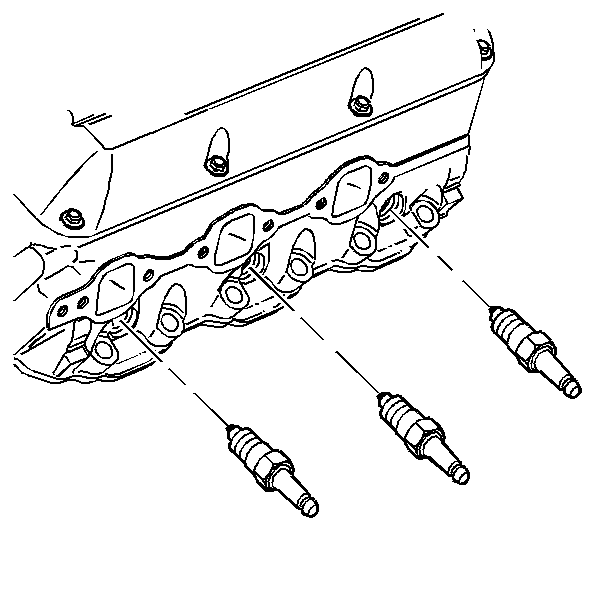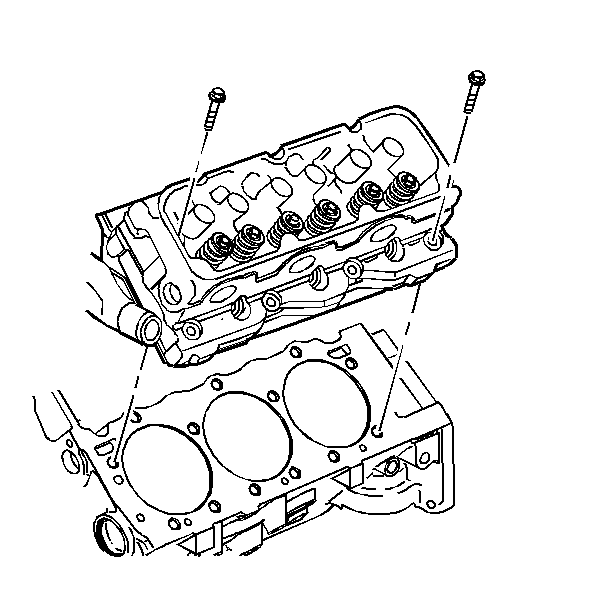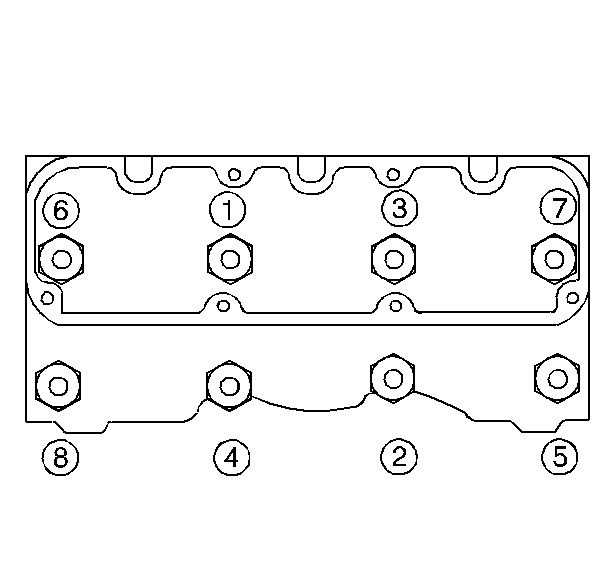Cylinder Head Replacement Left Side
Removal Procedure
Special Tools
J 36660-A Torque Angle Meter
- Remove the air cleaner duct. Refer to Air Cleaner Element .
- Remove the negative battery cable. Refer to
Caution: Unless directed otherwise, the ignition and start switch must be in the OFF or LOCK position, and all electrical loads must be OFF before servicing any electrical component. Disconnect the negative battery cable to prevent an electrical spark should a tool or equipment come in contact with an exposed electrical terminal. Failure to follow these precautions may result in personal injury and/or damage to the vehicle or its components.
. - Drain the coolant. Refer to cooling and radiator in Engine Cooling.
- Remove the intake manifold. Refer to Intake Manifold Replacement and Intake Manifold Replacement .
- Remove the rocker arm covers. Refer to Valve Rocker Arm Cover Replacement and Valve Rocker Arm Cover Replacement .
- Remove the rocker arms and pedestal bolts. Refer to Valve Rocker Arm and Push Rod Replacement .
- Remove the valve guide plates and pushrods. Refer to Valve Lifter Replacement .
- Remove the engine mount strut from the bracket at the cylinder head. Refer to Engine Mount Strut Replacement .
- Remove the vacuum line from the transaxle vacuum module. Refer to Transaxle Vacuumed Module in Automatic Transaxle On-Vehicle Service.
- Remove the left exhaust manifold. Refer to Exhaust Manifold Replacement .
- Remove the spark plugs. Refer to Spark Plug Wire in Engine Electrical.
- Remove the generator front mount bracket. Remove the ignition module with the mount bracket. Set the ignition module aside.
- Remove the cylinder head bolts. Discard the bolts.
- Remove the cylinder head.
- If the cylinder head is being replaced, transfer the following parts:
- If the cylinder head is to be serviced, the above parts must be removed and replaced, after servicing.
- Clean the mating surfaces on the cylinder head, the cylinder block and the intake manifold.
- Clean the cylinder block bolt hole threads using a 7/16-14 tap.
Important:
• During disassembly, ensure that the valve train components are kept together and identified so that they can be installed in their original locations and with the same mating surfaces as when removed. • Before removing the cylinder head(s) from the engine and before disassembling the valve mechanism, perform a compression test and note the results.

Important: Clean foreign material from the spark plug recess area before removing the plug.

| 15.1. | The engine mount strut bracket. Refer to Engine Mount Strut Replacement . |
| 15.2. | The exhaust support bracket with transaxle vacuum line. |
Installation Procedure
- Position the head gasket with the arrow pointing to the front of the engine.
- Install the cylinder head.
- Install the exhaust manifold. Refer to Exhaust Manifold Replacement .
- Install the new cylinder head bolts.
- Tighten the head bolts in sequence to 50 N·m (37 lb ft).
- Rotate each bolt in sequence 120 degrees. Use the J 36660-A .
- Rotate the center four bolts an additional 30 degrees. Use the J 36660-A
- Install the pushrods. Refer to Valve Rocker Arm and Push Rod Replacement .
- Install the valve guide retainers. Refer to Valve Lifter Replacement .
- Install the rocker arms and pedestal bolts. Refer to Valve Rocker Arm and Push Rod Replacement .
- Install the valve rocker arm cover. Refer to Valve Rocker Arm Cover Replacement and Valve Rocker Arm Cover Replacement .
- Install the intake manifold. Refer to Intake Manifold Replacement and Intake Manifold Replacement .
- Connect the vacuum line to the transaxle vacuum module. Refer to Transaxle Vacuum Module in Automatic Transaxle On-Vehicle Service.
- Install the generator front mount bracket.
- Install the ignition module with the mount bracket. Refer to Ignition Module in Charging System.
- Install the spark plugs. Refer to Spark Plug Replacement in Engine Electrical.
- Connect the wires to the spark plugs.
- Install the engine mount strut to the bracket at the head. Refer to Engine Mount Strut Replacement .
- Fill the engine coolant. Refer to Engine Coolant in Engine Cooling
- Connect the negative battery cable.
- Install the air cleaner duct. Refer to Air Cleaner Element .
- Inspect for proper fluid levels.
- Inspect for leaks.
Notice: Installing the head gasket with the arrow pointing to the front will cause gasket failure and possible engine failure. Head gaskets are not interchangeable.

Notice: This engine uses special torque to yield head bolts. This design bolt requires a special tightening procedure. Failure to follow the given procedure will cause head gasket failure and possible engine damage.

Notice: Use the correct fastener in the correct location. Replacement fasteners must be the correct part number for that application. Fasteners requiring replacement or fasteners requiring the use of thread locking compound or sealant are identified in the service procedure. Do not use paints, lubricants, or corrosion inhibitors on fasteners or fastener joint surfaces unless specified. These coatings affect fastener torque and joint clamping force and may damage the fastener. Use the correct tightening sequence and specifications when installing fasteners in order to avoid damage to parts and systems.
Tighten


Important: Drain the engine. Refill the crankcase. Do this in order to ensure that no coolant or foreign material contaminates the engine when removing the cylinder head.
Cylinder Head Replacement Right Side
Special Tools
J 36660-A Torque Angle Meter
Removal Procedure
- Remove the air cleaner duct. Refer to Driveability and Emissions in Engine Controls.
- Remove the negative battery cable. Refer to
Caution: Unless directed otherwise, the ignition and start switch must be in the OFF or LOCK position, and all electrical loads must be OFF before servicing any electrical component. Disconnect the negative battery cable to prevent an electrical spark should a tool or equipment come in contact with an exposed electrical terminal. Failure to follow these precautions may result in personal injury and/or damage to the vehicle or its components.
. - Drain the coolant. Refer to Draining and Filling in Engine Cooling.
- Remove the exhaust crossover pipe. Refer to Exhaust Crossover Pipe Replacement in Engine Exhaust.
- Remove the intake manifold. Refer to Intake Manifold Replacement and Intake Manifold Replacement .
- Raise the vehicle. Support the vehicle suitably. Refer to Vehicle Support in General Information.
- Remove the front exhaust pipe from the manifold. Refer to Exhaust Pipe in Exhaust System.
- Lower the vehicle.
- Remove the belt tensioner pulley.
- Remove the heater hose from the engine. Refer to Heater Hose in Engine Cooling.
- Remove the power steering pump mount bracket. Set the pump aside. Refer to Power Steering Pump Mount Bracket Replacement in Power Steering Gear and Pump.
- Remove the spark plug wires. Refer to Spark Plug Wire Replacement in Engine Electrical
- Remove the spark plugs. Refer to Spark Plug Replacement in Engine Electrical.
- Remove the electrical connection from the oxygen sensor.
- Remove the rocker arms and pedestal bolts. Refer to Valve Rocker Arm and Push Rod Replacement .
- Remove the valve guide retainers and pushrods. Refer to Valve Lifter Replacement .
- Remove the cylinder head bolts.
- Remove the cylinder head.
- Remove the exhaust manifold. Refer to Exhaust Manifold Replacement .
- Clean the mating surfaces on the cylinder head, cylinder block and the intake manifold.
- Clean the cylinder block bolt hole threads using a 7/16-14 tap.



Installation Procedure
- Position the head gasket with the arrow pointing to the front of the engine.
- Place the exhaust manifold in place.
- Install the cylinder head.
- Install the new cylinder head bolts.
- Tighten the bolts in sequence to 50 N·m (37 lb ft).
- Rotate each bolt 120 degrees in sequence. Use the J 36660-A .
- Rotate the center four bolts an additional 30 degrees. Use the J 36660-A .
- Install the electrical connection to the oxygen sensor.
- Install the exhaust manifold. Refer to Exhaust Manifold Replacement .
- Install the intake manifold. Refer to Intake Manifold Replacement and Intake Manifold Replacement .
- Install the pushrods. Refer to Valve Rocker Arm and Push Rod Replacement .
- Install the valve guide retainers. Refer to Valve Lifter Replacement .
- Install the rocker arms and pedestal bolts. Refer to Valve Rocker Arm and Push Rod Replacement .
- Install the rocker arm cover. Refer to Valve Rocker Arm Cover Replacement and Valve Rocker Arm Cover Replacement .
- Install the spark plugs. Refer to Spark Plug Replacement in Engine Electrical.
- Connect the wires to the spark plugs. Refer to Spark Plug Replacement in Engine Electrical.
- Install the power steering pump bracket. Refer to Power Steering Pump Mount Bracket Replacement in Power Steering Gear and Pump.
- Install the belt tensioner pulley.
- Install the heater hose to the engine. Refer to Heater Hose in Engine Cooling.
- Install the exhaust crossover pipe. Refer to Exhaust Crossover Pipe Replacement in Engine Exhaust.
- Raise the vehicle. Suitably support the vehicle. Refer to Vehicle Support in General Information.
- Install the front exhaust pipe to the manifold. Refer to Exhaust Crossover Pipe Replacement in Engine Exhaust.
- Lower the vehicle.
- Fill the engine coolant. Refer to Engine Coolant in Engine Cooling.
- Connect the negative battery cable.
- Install the air cleaner duct. Refer to Driveability and Emissions in Engine Controls.
- Inspect for proper fluid levels.
- Inspect for leaks.
Notice: Installing the head gasket with the arrow pointing to the front will cause gasket failure and possible engine failure. Head gaskets are not interchangeable.

Notice: This engine uses special torque to yield head bolts. This design bolt requires a special tightening procedure. Failure to follow the given procedure will cause head gasket failure and possible engine damage.

Notice: Use the correct fastener in the correct location. Replacement fasteners must be the correct part number for that application. Fasteners requiring replacement or fasteners requiring the use of thread locking compound or sealant are identified in the service procedure. Do not use paints, lubricants, or corrosion inhibitors on fasteners or fastener joint surfaces unless specified. These coatings affect fastener torque and joint clamping force and may damage the fastener. Use the correct tightening sequence and specifications when installing fasteners in order to avoid damage to parts and systems.
Tighten


Important: Drain the engine. Refill the crankcase. Do this in order to ensure that no coolant or foreign material contaminates the engine when removing the cylinder head.
